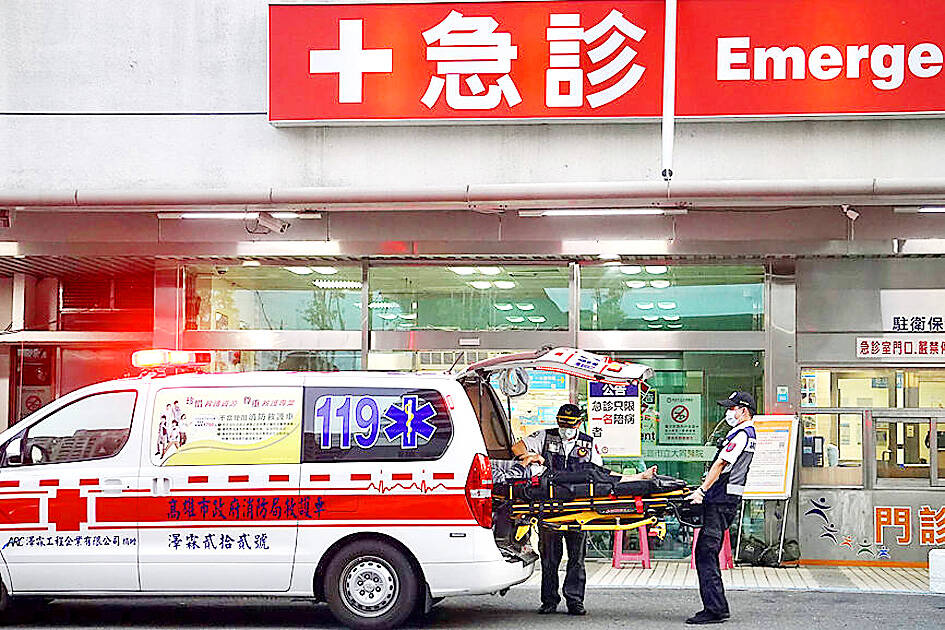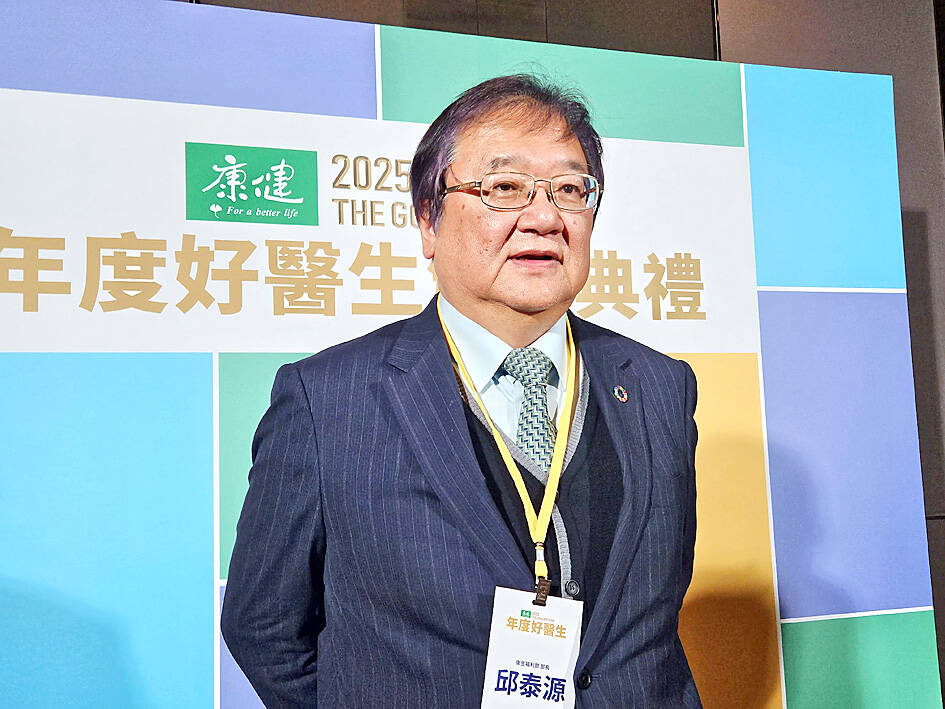The government must take action to relieve unprecedented overcrowding in hospital emergency rooms (ER), the Taiwan Society of Emergency Medicine said on Saturday.
The group said in a statement that if the problem worsens it could lead to the resignation of emergency medical workers, which would affect patient safety and healthcare quality, and weaken the nation’s healthcare capacity.
There are too many people in emergency rooms who are not being transferred after being admitted, forcing critically ill people to remain in ERs, the group said.

Photo: CNA
The root cause is insufficient inpatient beds, which could be due to a nursing shortage, forcing hospitals to close off beds or maintain an imbalanced or insufficient allocation of beds, it said.
In the short term, the government could require hospitals to open beds in other departments to more flexibly admit patients when ERs are overcrowded, which would improve the management of beds in intensive care units to ensure reasonable allocation, it said.
Hospitals should also increase the number of emergency medical staff when ERs are overcrowded, which would improve the quality of healthcare and help prevent burnout, it said, adding that hierarchical diagnosis and treatment systems should be better implemented.

Photo: CNA
Long-term solutions include setting up and funding an ER emergency situation response mechanism, so that hospitals can collaborate in solving the problem, the association said.
The government should also consider adjusting the National Health Insurance payment for ER visits to encourage hospitals to admit critically ill patients and ensure their safety, it said.
Other solutions include promoting alternative options for ER hospitalization, such as acute hospital care at home programs or outpatient parenteral antibiotic therapy models, it said, adding that the government should also set up a mechanism to monitor the number of available inpatient or ER hospital beds, so it can adjust policies and resource allocation.
Minister of Health and Welfare Chiu Tai-yuan (邱泰源) yesterday thanked the Taiwan Society of Emergency Medicine for its suggestions and ER medical personnel for their hard work.
The ministry has gathered local health department officials, representatives of medical centers and physicians’ associations to discuss ER overcrowding, Chiu said.
The ministry has asked hospitals to readjust the proportion of inpatient and ER beds, to hopefully add more ER beds, he said.
However, it would be a challenging task for hospital superintendents, as many people require hospitalization, he said.
The ministry has also asked hospitals to increase ER personnel levels to ease their workload and pressure, while the ministry would continue to work with the National Health Insurance Administration on how to retain ER staff, through better wages or other methods, he said.
Chiu said the ministry and physicians’ associations have been promoting hierarchical diagnosis and treatment systems, encouraging people with mild symptoms of illnesses such as influenza to first seek medical attention at clinics or local hospitals, and go to larger hospitals through referrals.
Additional reporting by CNA

CHAOS: Iranians took to the streets playing celebratory music after reports of Khamenei’s death on Saturday, while mourners also gathered in Tehran yesterday Iranian Supreme Leader Ayatollah Ali Khamenei was killed in a major attack on Iran launched by Israel and the US, throwing the future of the Islamic republic into doubt and raising the risk of regional instability. Iranian state television and the state-run IRNA news agency announced the 86-year-old’s death early yesterday. US President Donald Trump said it gave Iranians their “greatest chance” to “take back” their country. The announcements came after a joint US and Israeli aerial bombardment that targeted Iranian military and governmental sites. Trump said the “heavy and pinpoint bombing” would continue through the week or as long

TRUST: The KMT said it respected the US’ timing and considerations, and hoped it would continue to honor its commitments to helping Taiwan bolster its defenses and deterrence US President Donald Trump is delaying a multibillion-dollar arms sale to Taiwan to ensure his visit to Beijing is successful, a New York Times report said. The weapons sales package has stalled in the US Department of State, the report said, citing US officials it did not identify. The White House has told agencies not to push forward ahead of Trump’s meeting with Chinese President Xi Jinping (習近平), it said. The two last month held a phone call to discuss trade and geopolitical flashpoints ahead of the summit. Xi raised the Taiwan issue and urged the US to handle arms sales to

BIG SPENDERS: Foreign investors bought the most Taiwan equities since 2005, signaling confidence that an AI boom would continue to benefit chipmakers Taiwan Semiconductor Manufacturing Co’s (TSMC, 台積電) market capitalization swelled to US$2 trillion for the first time following a 4.25 percent rally in its American depositary receipts (ADR) overnight, putting the world’s biggest contract chipmaker sixth on the list of the world’s biggest companies by market capitalization, just behind Amazon.com Inc. The site CompaniesMarketcap.com ranked TSMC ahead of Saudi Aramco and Meta Platforms Inc. The Taiwanese company’s ADRs on Tuesday surged to US$385.75 on the New York Stock Exchange, as strong demand for artificial intelligence (AI) applications led to chip supply constraints and boost revenue growth to record-breaking levels. Each TSMC ADR represents

State-run CPC Corp, Taiwan (CPC, 台灣中油) yesterday said that it had confirmed on Saturday night with its liquefied natural gas (LNG) and crude oil suppliers that shipments are proceeding as scheduled and that domestic supplies remain unaffected. The CPC yesterday announced the gasoline and diesel prices will rise by NT$0.2 and NT$0.4 per liter, respectively, starting Monday, citing Middle East tensions and blizzards in the eastern United States. CPC also iterated it has been reducing the proportion of crude oil imports from the Middle East and diversifying its supply sources in the past few years in response to geopolitical risks, expanding